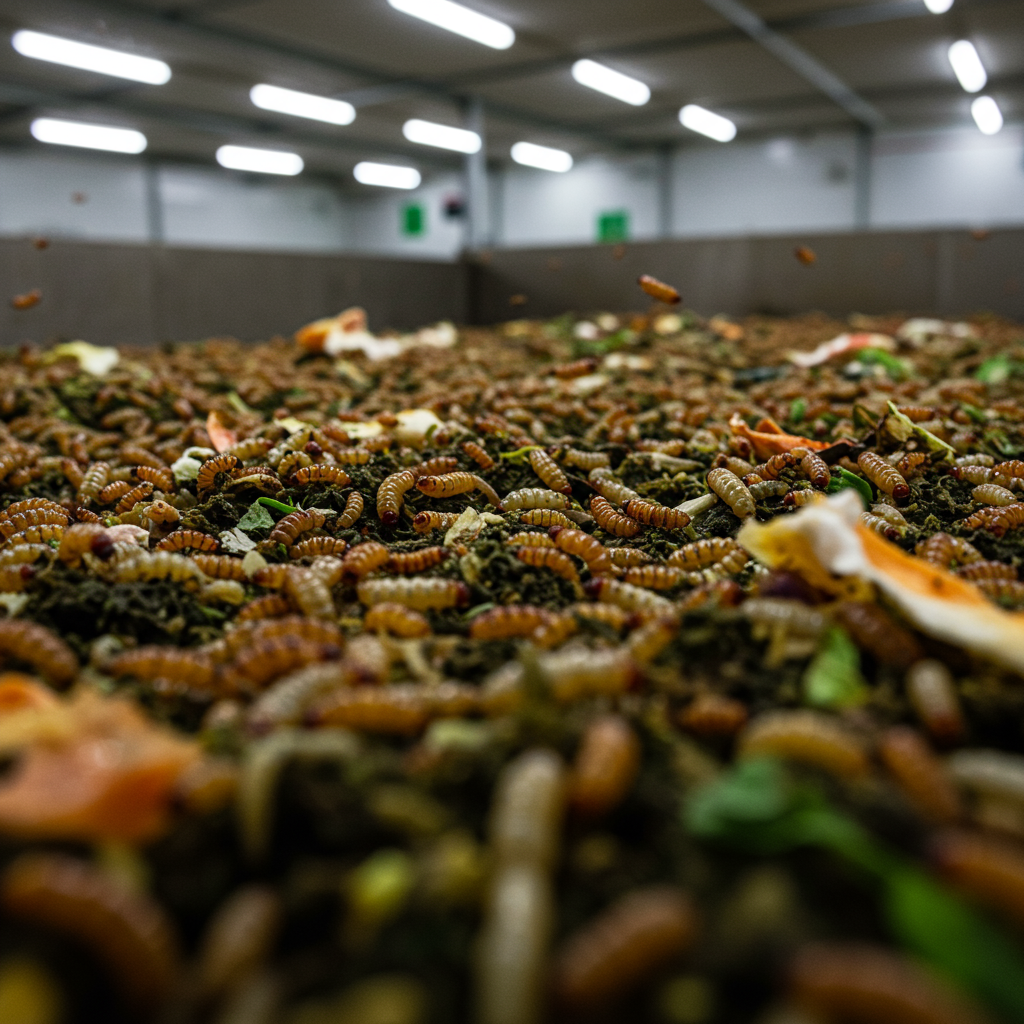The instinctive reaction for most people is to keep flies far away from food. The very idea of maggots near our discarded scraps is enough to prompt immediate efforts to seal bins and shoo away pests. Yet, a revolutionary approach to waste management is challenging this conventional thinking, proposing that these very creatures – fly larvae – might hold a key to sustainably processing our growing mountain of food waste.
Across the globe, pioneering initiatives are turning to the humble fly, specifically the larvae of certain species like the Black Soldier Fly, to tackle organic waste on an industrial scale. Their incredible appetite for rotting organic matter makes them highly efficient biological processors.
A City Embraces Insect Recycling: The Vilnius Model
In Vilnius, Lithuania, the capital city has officially enlisted fly larvae in its fight against food waste. Partnering with waste management company Energesman, the city and six neighbouring councils are processing thousands of tonnes of food waste annually. Energesman currently provides this service without charge to Vilnius, a move that could save the city significant amounts – potentially up to €2 million per year by 2026, based on processing targets.
The process relies on cultivating vast numbers of flies. Energesman houses millions of flies in a dedicated facility, where they reproduce rapidly. A single female fly can lay hundreds of eggs in her short lifespan, leading to millions of ravenous larvae being produced each month. These larvae are the true workhorses, capable of consuming enormous volumes of food waste in their early, most active stages. The key to this sustainable system is to harvest the protein-rich larvae before they mature into adult flies, preventing unwanted populations from emerging.
The Process: From Scraps to Resources
This “insect recycling” method doesn’t just make waste disappear; it transforms it into valuable resources. Once the larvae have feasted and grown, their bodies are rich in protein. This protein can be converted into ingredients for animal feed or processed for various industrial applications, such as components in paint, glue, or even materials for furniture and lampshades.
Additionally, the waste produced by the larvae, known as frass, is a potent organic fertiliser. This byproduct can be used to enrich soil, completing a valuable nutrient cycle.
Developing Markets and Regulatory Hurdles
While the biological process is effective, developing viable markets for these novel protein products and frass is an ongoing effort. Early trials, such as using larvae-derived ingredients in paint, are showing mixed results, though potential applications like lampshades appear promising.
Further complicating the picture are regulations. In the EU, health and safety rules currently prevent fly larvae processed using kitchen waste (which can include meat and fish scraps) from being used in food products for human consumption, largely due of concerns about potential cross-contamination. This limits the potential market for the protein.
Global Efforts in Insect Waste Management
The use of fly larvae for waste processing isn’t confined to Europe. Examples exist in various parts of the world, often operating on a commercial scale through private contracts. In Kenya, Project Mila is a social enterprise utilizing fly larvae to address food waste issues in Mombasa while simultaneously producing valuable frass for local farmers. Australia has also seen trials, with companies like Goterra working with councils in Sydney and the Queanbeyan-Palerang region to process food waste using larvae.
Despite these successful examples and the clear benefits, only a handful of city councils globally have widely adopted this method, highlighting the relative novelty and potential challenges in broader municipal implementation.
The UK Challenge: Regulation vs. Potential
The potential for insect-based waste processing is significant in the UK, especially with mandatory household food waste collections set to be rolled out across England from March 2026. Currently, many local authorities do not offer this service, and the anticipated increase in collected food waste will require robust processing solutions.
Companies like Flybox are active in the UK, primarily working with private sector clients such as food manufacturers. The insect waste management industry believes councils are interested in exploring this technology as an alternative to current methods like anaerobic digestion (AD), which they argue may not have sufficient capacity for the impending volume increase.
However, a major barrier in the UK is regulatory. The Department for Environment, Food and Rural Affairs (DEFRA) currently restricts the use of insects for processing certain organic waste streams through its Animal By-Product Regulations. DEFRA cites biosecurity and disease risk as reasons for these restrictions and has indicated no immediate plans to review them. Industry proponents argue that if regulations could align with the scientific possibilities, council-backed insect processing facilities could become a reality relatively quickly.
The Bigger Picture: Benefits of Insect Recycling
Globally, over a billion tonnes of food are wasted each year. Expert estimates suggest a significant portion of this could be “upcycled” using insect waste management. This method offers compelling advantages:
Waste Reduction: Efficiently breaks down large volumes of organic waste.
Environmental Impact: Avoids sending food waste to landfill, reducing methane emissions – a potent greenhouse gas.
Resource Creation: Converts waste into valuable protein for animal feed or industrial use, and nutrient-rich organic fertiliser (frass).
Potential Cost Savings: As demonstrated in Vilnius, it can potentially offer significant cost benefits compared to traditional waste disposal methods.
While the idea might initially trigger squeamishness, the science and economic potential of using fly larvae as biological food waste processors are undeniable. As cities and nations grapple with increasing waste volumes and the urgent need for sustainable solutions, “insect recycling” presents an innovative and potentially transformative path forward, provided market development and regulatory hurdles can be successfully navigated.



